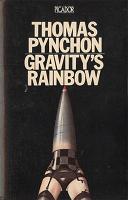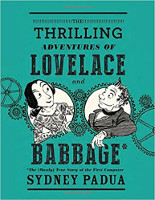 Here's my old review of an even older book - Gravity’s Rainbow by Thomas Pynchon, a ‘grand book’ of fantastic fiction, providing an alternative history of the end of the 2nd World War, and the history V2/A4 rockets and the people infatuated with them.
Here's my old review of an even older book - Gravity’s Rainbow by Thomas Pynchon, a ‘grand book’ of fantastic fiction, providing an alternative history of the end of the 2nd World War, and the history V2/A4 rockets and the people infatuated with them.
The story starts shortly before the end of WWII, in a London bombarded by V2/A4 rockets. Portsman, manager of an organization that performs research in a number of areas (Pavlovian reactions. Para-normal activities and ESP. Statistical analysis of the V2 attack. Go figure…), keeps a map in his office showing the rocket impact sites.
Tyrone Slothrop, an American Lieutenant in London, who was conditioned as baby to get an erection on hearing a bang (and not properly de-conditioned), keeps a map in his office, showing the locations of his female conquests in London.
The maps match.
Somehow Slothrop (who is always ahead of the rocket, sometimes by hours, sometimes by several days) is linked to the A4. Like a Pavlovian reflex, with cause and action reversed in time – he gets his erection BEFORE the bang of the rocket. Or do the rockets follow his movements? Which explanation is less unlikely? And does the fact that you can only hear the rocket approach if you’ve survived the explosion (as it’s faster than sound!) have something to do with this inversion?
Slothrop is being watched, studied. Pavlovian, para-normal, statistical.
As the war ends he follows the trail of the rocket into the ‘zone’ where it was developed, manufactured, fired. The zone is occupied by a number of armies, all trying to pick up as much rocket technology and personnel as possible. The zone is also home a hotchpotch of strange characters (like Slothrop himself), legal, illegal, intelligence, counter-intelligence, on a spiritual trip, on an ego-trip, or on their way to oblivion - engineers, black marketers, salvagers, victims - you name it.
I was initially not sure if I really liked this book. On the one hand it is interesting, thought provoking, engrossing. But on the other hand it feels too wordy, overly spread out whilst trying to provide background to minor threads, or provide ‘evocative’ descriptions of places or states of mind, or long lists of things and similes; sometimes across multiple pages. You might like stuff like this, I have a tendency to fast-forward/skim/skip if this happens too frequently, and doesn’t provide any additional insights or identification with the situation or the character. All a question of taste, I guess… the book definitely grew on me, the deeper you immerse yourselves in this sprawling, non-linear world the more mind-expanding and engrossing the book becomes.
The characters… most of them are cartoonish, complexely clichéd, larger than life in heroism, good deeds, as well as in their monstrous sides and in their failings. A lot of the book is written as if it were a musical, and a lot of the characters fit this notion. Not a bad thing per se, and definitely fitting the plot as well as the general feel of unrealness and disconnectedness of the story. Just don’t expect a real-life account, but let the author carry you across into his gritty, slightly off-kilter dream world.
The plot keeps switching between quite fast-paced ‘action’ or at least activity scenes, and slow, droning, mood-setting descriptions and reflections. The main thread of the story is interspersed with so many side-plots, flash-backs, and background information on the protagonists that at times I was tempted to start keeping notes on the different threads and connections, instead of skipping back and forth, re-reading and trying to make all the right connections. I might have to re-read the book again, as I still feel cheated of the outcomes of some of the threads – but might simply not have connected earlier parts of the story, or hints on where things were going/went…
Besides the parts concerning pavlovian theory there is a lot of information regarding the technology of the A4 rocket, the end of the war and the world this, at least for some time, left behind in occupied Germany, and of course the state of the human mind. I was (actually still am) sorely tempted to start researching which bits of the technical, historical, and conspirational background the author uses are/were true, and which ones are excellently conceived and executed fiction. Mind-expanding, either way. Including the decidedly kinky sex scenes, which, as far as I see, mainly serve to illuminate characters and their though processes and hang-ups (away from sex, that is).
I can highly recommend the book; it’s a great, or maybe even a grand work of fantastic literature. Be warned, though, it is neither short nor always an easy read, but it will draw you into the story, make you wish (or actually dream) you were there, and part of the story. If you want to try Thomas Pynchon, but would like to start with something a bit lighter then I’d recommend you read ‘Vineland’, his story of disillusioned hippies in Ronald Reagan’s 80s America with it’s anti-drugs hysteria first, and then decide if you can take much much more of the same.
Title: Gravity’s Rainbow
Author: Thomas Pynchon
Reviewer: Markus
Publisher: Pan Books
Publication Date: 1973
Review Date: Oct 2 2005
ISBN: 0330242814
Price: UKP1.5
Pages: 760
Format: Paperback
Topic: Fiction
Topic: Alternate History












